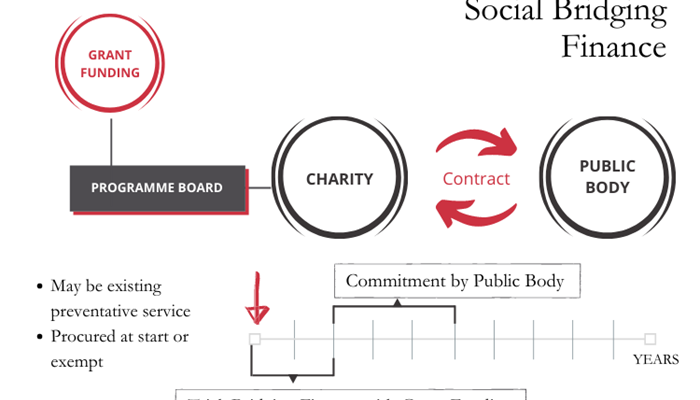"As a funding approach, SBF aims to ensure the long-term sustainability of third sector services which can evidence success by enabling public services to innovate and move resources towards preventative services and measures."
A key component of our new strategy is a commitment to curiosity and continuous improvement. Rather than looking for single answers or the ‘right way’ of doing things, we are committed to building our knowledge and using learning to continually make informed decisions about not only what we fund, but also how we fund. This includes looking at how we can use our resources to best drive positive change.
With this in mind, in 2019 we launched our Social Bridging Finance (SBF) pilot. The aim was to build knowledge around an alternative funding model which brings together a working partnership of public sector, third sector and independent funders. Although SBF began in our previous strategic period, its aims continue to align with our vision and many of the goals detailed in our new 2020-30 strategy.
The SBF pilot
SBF is currently being trialled by three demonstration projects based in Dundee, East Renfrewshire and South Ayrshire. As a funding approach, SBF aims to ensure the long-term sustainability of third sector services which can evidence success by enabling public services to innovate and move resources towards preventative services and measures.
The initial demonstration phase of the projects have been grant funded through an SBF contract, which underpins and sets out success criteria as agreed by both partners prior to the project’s launch. Should the delivery organisation meet these criteria, the public sector organisation is then committed to sustaining the service for the long-term.
As part of our commitment to becoming a learning organisation, we commissioned Iconic and Glasgow Caledonian University to carry out an evaluation of the model’s pilot. Our aim is to determine whether SBF as a funding model is useful in driving long term change in the relationships between public and third sector organisations, and how they deliver services together. At the same time, we hope to build our understanding of how we can effectively use the model by building a suite of information and ‘how to’ materials, for use not only by us, but by other funders, public and third sector organisations. We want to understand not only the strengths of SBF, but also the challenges around implementation.
Early findings
Although the full evaluation does not conclude until summer 2022, we are committed to sharing updates throughout the SBF journey.
Early findings from the evaluation have largely focused on the implementation phase, with a recent interim report (which can be downloaded here) highlighting:
- Clarity of purpose is key when determining the suitability of an SBF project – ideally, the project should be an evidence-based solution that addresses a critical issue jointly identified by the third and public sector
- It is important to follow best practice when setting success criteria (including SMART (Specific, Measurable, Achievable, Relevant and Time-Bound) and a successful track record of service delivery elsewhere)
- The significant value of the work being underpinned by a contract, particularly in terms of focusing minds, encouraging early conversations around sustainability and creating more equitable relationships between the third sector and public sector partners.
- Strong relationships are key, with the strength of partnership working being one of the most striking features of the trial to date
- The importance of involving key senior staff and elected members, with Project Boards playing a crucial role in uniting senior stakeholders
What next?
Our SBF guidance document has been updated to reflect this latest learning and this will continue to be a ‘live’ document to ensure it reflects the latest findings around the model. If you would like us to send the latest iteration of this, please contact the project lead, Terri Merricks, at terri.merricks@therobertsontrust.org.uk
Meanwhile, the full interim evaluation report is available here and executive summary here for those wish to download it. We anticipate sharing more regular updates in the coming months around SBF and would encourage all those with an interest in the model to sign up for our mailing list and follow our social channels on Linkedin and Twitter.We are also keen to hear from others who are testing similar funding models and to share learning and develop understanding
Case study
The European Venture Philanthropy Association (EVPA) recently featured Social Bridging Finance as a case study. This can be read here.

